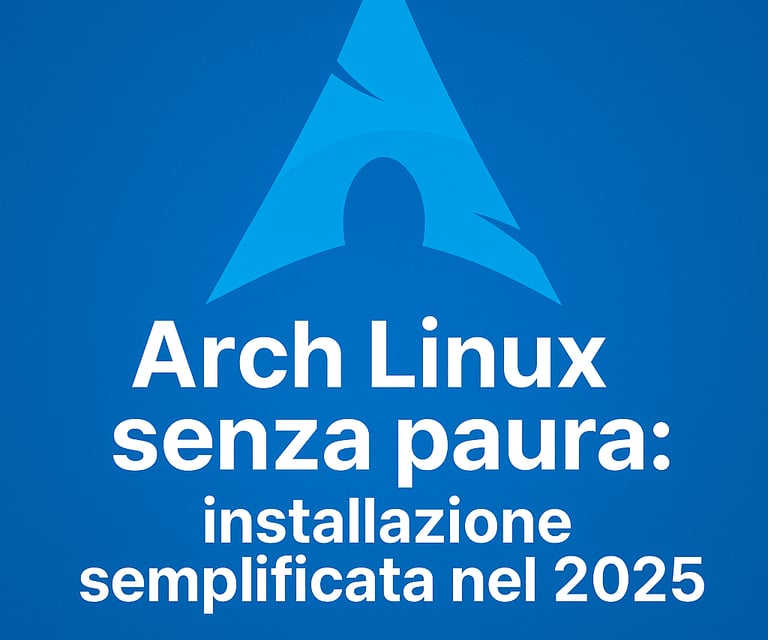Arch Linux Made Easy: A Simplified Installation in 2025
A complete and updated guide to installing Arch Linux in 2025, without panic or frustration. Every step explained from scratch, from downloading the ISO to booting your system for the first time. Perfect for motivated users (not necessarily experts).
SISTEMI OPERATIVI
ZeroCrash
7/20/20252 min read


Arch Linux Made Easy: A Simplified Installation in 2025
Arch Linux has a very clear reputation: it’s the OS for people who want to understand every single detail of their system. Minimal, powerful — but also… intimidating.
Fortunately, in 2025, installing Arch is no longer a rite of passage. Just follow the right guide. Like this one.
🔧 What You Need Before You Start
No computer science degree required. Just have:
💻 A PC (even old, but with at least 2 GB of RAM)
🔌 A USB stick (min. 2 GB)
🖥️ A second device to read this guide during installation
🧠 A curious mindset (no stress needed)
📥 1. Download the Arch Linux ISO
Go to the official website archlinux.org and download the latest ISO (netinstall version — light and up-to-date).
You can verify the signature for security, though it's optional.
🔥 2. Create a Bootable USB
Depending on your OS:
Windows: Rufus
Linux: dd via terminal or balenaEtcher
MacOS: balenaEtcher
Example using dd on Linux:
sudo dd if=archlinux.iso of=/dev/sdX bs=4M status=progress && sync
(Replace sdX with your actual USB device. WARNING: this erases it.)
⚙️ 3. Boot From the USB
Restart your computer and access the BIOS (usually [F2], [F12] or [Del]).
Set your USB stick as the first boot device.
You’ll enter Arch’s live terminal.
🧩 4. Check Your Internet Connection
Arch requires internet to install. If you're wired via Ethernet, you’re ready.
If you’re on Wi-Fi:
iwctl
station wlan0 connect yournetworkname
(Use device list to find the correct interface if wlan0 doesn't work.)
📐 5. Disk Partitioning
Use cfdisk for a simple interface:
cfdisk
Create:
an EFI partition (512MB, type: EFI System)
a root partition (/) for the OS (recommended: ext4)
optionally, a swap partition
Write changes and exit.
💾 6. Format the Partitions
mkfs.fat -F32 /dev/sdX1 # EFI partition
mkfs.ext4 /dev/sdX2 # root partition
mkswap /dev/sdX3 # optional
swapon /dev/sdX3 # activate swap
📦 7. Mount the Partitions
mount /dev/sdX2 /mnt
mkdir /mnt/boot
mount /dev/sdX1 /mnt/boot
🛠️ 8. Install the Base System
Here’s the core install command:
pacstrap -K /mnt base linux linux-firmware nano networkmanager
This installs the OS base, the kernel, firmware, a text editor (nano), and NetworkManager to handle your internet connection.
📁 9. Generate fstab
genfstab -U /mnt >> /mnt/etc/fstab
Verify with:
cat /mnt/etc/fstab
🔄 10. Chroot Into the New System
arch-chroot /mnt
You’re now inside your new Arch installation.
🕒 11. Set the Timezone
ln -sf /usr/share/zoneinfo/Europe/Rome /etc/localtime
hwclock --systohc
📝 12. Localization
Open /etc/locale.gen with nano and uncomment en_US.UTF-8 or your preferred locale:
nano /etc/locale.gen
Then generate it:
locale-gen
echo "LANG=en_US.UTF-8" > /etc/locale.conf
💡 13. Basic Settings
Set the hostname:
echo zerocrash-machine > /etc/hostname
Edit /etc/hosts:
echo "127.0.0.1 localhost" >> /etc/hosts
echo "::1 localhost" >> /etc/hosts
echo "127.0.1.1 zerocrash-machine.localdomain zerocrash-machine" >> /etc/hosts
🔑 14. Set the Root Password
passwd
Type your new password.
🔄 15. Install the Bootloader
For UEFI systems:
pacman -S grub efibootmgr
grub-install --target=x86_64-efi --efi-directory=/boot --bootloader-id=GRUB
grub-mkconfig -o /boot/grub/grub.cfg
🔌 16. Enable Networking Services
systemctl enable NetworkManager
✅ 17. Reboot!
exit
umount -R /mnt
reboot
Remove the USB. If everything went well, you’ll see the GRUB menu and boot into your fresh Arch Linux system.
🧠 Final Thoughts
Arch Linux doesn’t have to be a mystery.
With the right steps and some attention to detail, it becomes your fully custom OS, always up to date and totally under your control.
You don’t need to be a hacker.
You just need a good guide — and now you have it.
ZeroCrash
Social
Practical guides to solve tech problems.
Contacts
Join the ZeroCrash Club
© 2025 ZeroCrash | Powered by cervello + coffee | All rights reserved.
